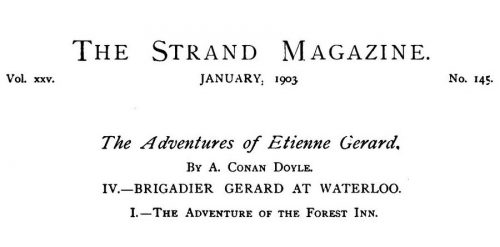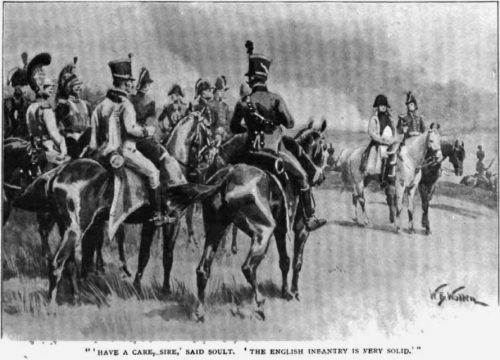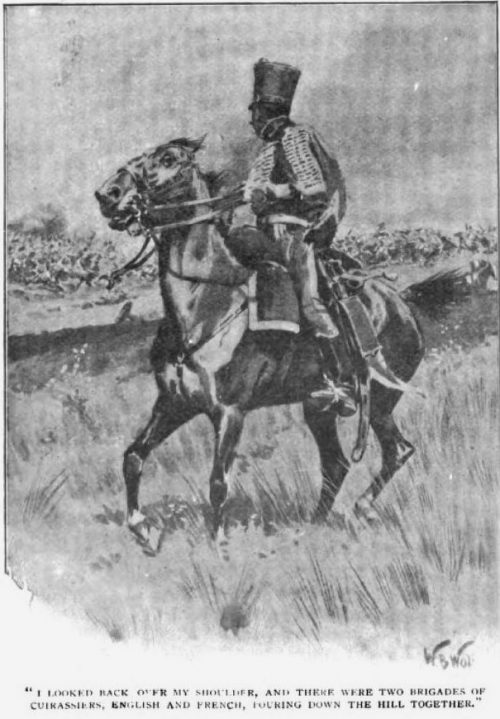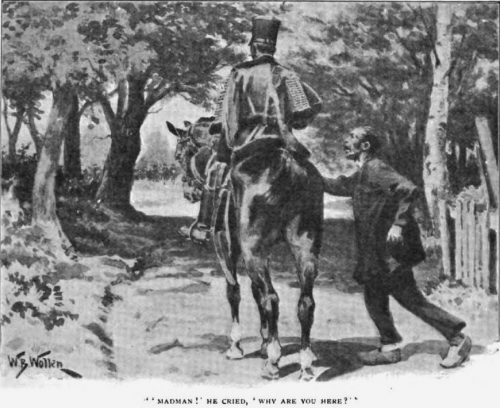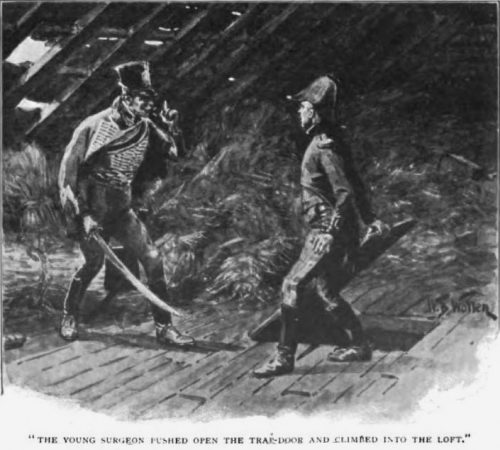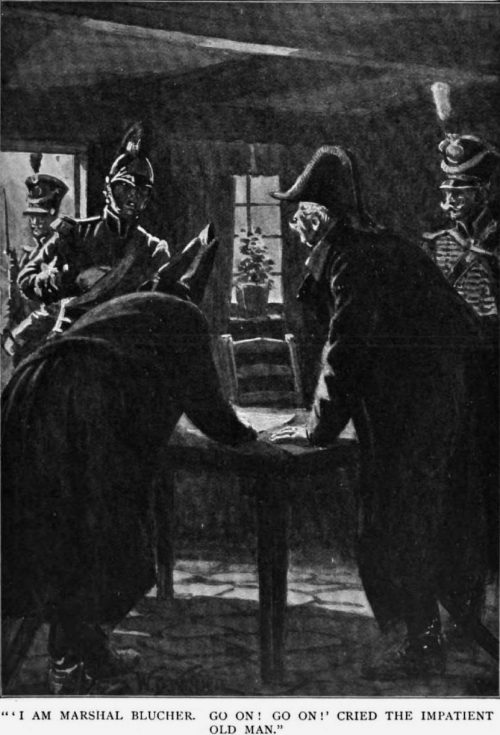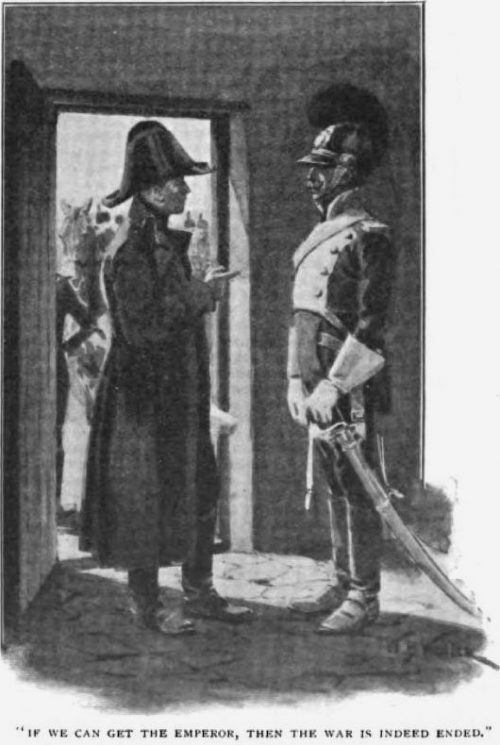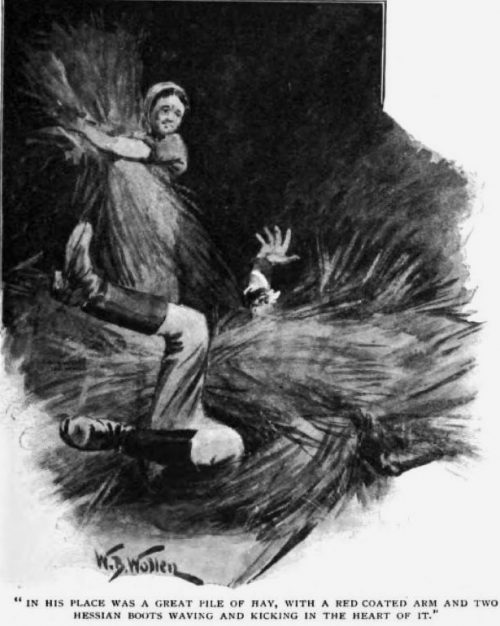How the Brigadier Bore Himself at Waterloo: I. The Story Of The Forest Inn : The Adventures of Brigadier Gerard by Arthur Conan Doyle
How the Brigadier Bore Himself at Waterloo: I. The Story Of The Forest Inn
by
Sir Arthur Conan Doyle
First published in The Strand Magazine, January 1903
First book appearance in The Adventures Of Brigadier Gerard, 1903
With illustrations by William Barnes Wollen
Brigadier Gerard Story XIII. How the Brigadier Bore Himself at Waterloo: I. The Story Of The Forest Inn
Of all the great battles in which I had the honour of drawing my sword for the Emperor and for France there was not one which was lost. At Waterloo, although, in a sense, I was present, I was unable to fight, and the enemy was victorious. It is not for me to say that there is a connection between these two things. You know me too well, my friends, to imagine that I would make such a claim. But it gives matter for thought, and some have drawn flattering conclusions from it.
After all, it was only a matter of breaking a few English squares and the day would have been our own. If the Hussars of Conflans, with Etienne Gerard to lead them, could not do this, then the best judges are mistaken.
But let that pass. The Fates had ordained that I should hold my hand and that the Empire should fall. But they had also ordained that this day of gloom and sorrow should bring such honour to me as had never come when I swept on the wings of victory from Boulogne to Vienna.
Never had I burned so brilliantly as at that supreme moment when the darkness fell upon all around me. You are aware that I was faithful to the Emperor in his adversity, and that I refused to sell my sword and my honour to the Bourbons. Never again was I to feel my war horse between my knees, never again to hear the kettledrums and silver trumpets behind me as I rode in front of my little rascals. But it comforts my heart, my friends, and it brings the tears to my eyes, to think how great I was upon that last day of my soldier life, and to remember that of all the remarkable exploits which have won me the love of so many beautiful women, and the respect of so many noble men, there was none which, in splendour, in audacity, and in the great end which was attained, could compare with my famous ride upon the night of June 18th, 1815. I am aware that the story is often told at mess-tables and in barrack-rooms, so that there are few in the army who have not heard it, but modesty has sealed my lips, until now, my friends, in the privacy of these intimate gatherings, I am inclined to lay the true facts before you.
In the first place, there is one thing which I can assure you. In all his career Napoleon never had so splendid an army as that with which he took the field for that campaign. In 1813 France was exhausted. For every veteran there were five children—Marie Louises, as we called them; for the Empress had busied herself in raising levies while the Emperor took the field. But it was very different in 1815. The prisoners had all come back —the men from the snows of Russia, the men from the dungeons of Spain, the men from the hulks in England.
These were the dangerous men, veterans of twenty battles, longing for their old trade, and with hearts filled with hatred and revenge. The ranks were full of soldiers who wore two and three chevrons, every chevron meaning five years’ service. And the spirit of these men was terrible. They were raging, furious, fanatical, adoring the Emperor as a Mameluke does his prophet, ready to fall upon their own bayonets if their blood could serve him. If you had seen these fierce old veterans going into battle, with their flushed faces, their savage eyes, their furious yells, you would wonder that anything could stand against them. So high was the spirit of France at that time that every other spirit would have quailed before it; but these people, these English, had neither spirit nor soul, but only solid, immovable beef, against which we broke ourselves in vain. That was it, my friends! On the one side, poetry, gallantry, self-sacrifice—all that is beautiful and heroic. On the other side, beef. Our hopes, our ideals, our dreams— all were shattered on that terrible beef of Old England.
You have read how the Emperor gathered his forces, and then how he and I, with a hundred and thirty thousand veterans, hurried to the northern frontier and fell upon the Prussians and the English. On the 16th of June, Ney held the English in play at Quatre-Bras while we beat the Prussians at Ligny. It is not for me to say how far I contributed to that victory, but it is well known that the Hussars of Conflans covered themselves with glory. They fought well, these Prussians, and eight thousand of them were left upon the field. The Emperor thought that he had done with them, as he sent Marshal Grouchy with thirty-two thousand men to follow them up and to prevent their interfering with his plans. Then with nearly eighty thousand men, he turned upon these “Goddam” Englishmen. How much we had to avenge upon them, we Frenchmen—the guineas of Pitt, the hulks of Portsmouth, the invasion of Wellington, the perfidious victories of Nelson! At last the day of punishment seemed to have arisen.
Wellington had with him sixty-seven thousand men, but many of them were known to be Dutch and Belgian, who had no great desire to fight against us. Of good troops he had not fifty thousand. Finding himself in the presence of the Emperor in person with eighty thousand men, this Englishman was so paralysed with fear that he could neither move himself nor his army. You have seen the rabbit when the snake approaches. So stood the English upon the ridge of Waterloo. The night before, the Emperor, who had lost an aide-de-camp at Ligny, ordered me to join his staff, and I had left my Hussars to the charge of Major Victor. I know not which of us was the most grieved, they or I, that I should be called away upon the eve of battle, but an order is an order, and a good soldier can but shrug his shoulders and obey. With the Emperor I rode across the front of the enemy’s position on the morning of the 18th, he looking at them through his glass and planning which was the shortest way to destroy them. Soult was at his elbow, and Ney and Foy and others who had fought the English in Portugal and Spain. “Have a care, Sire,” said Soult. “The English infantry is very solid.”
“You think them good soldiers because they have beaten you,” said the Emperor, and we younger men turned away our faces and smiled. But Ney and Foy were grave and serious. All the time the English line, chequered with red and blue and dotted with batteries, was drawn up silent and watchful within a long musket-shot of us. On the other side of the shallow valley our own people, having finished their soup, were assembling for the battle. It had rained very heavily, but at this moment the sun shone out and beat upon the French army, turning our brigades of cavalry into so many dazzling rivers of steel, and twinkling and sparkling on the innumerable bayonets of the infantry. At the sight of that splendid army, and the beauty and majesty of its appearance, I could contain myself no longer, but, rising in my stirrups, I waved my busby and cried, “Vive l’Empereur!” a shout which growled and roared and clattered from one end of the line to the other, while the horsemen waved their swords and the footmen held up their shakos upon their bayonets. The English remained petrified upon their ridge. They knew that their hour had come.
And so it would have come if at that moment the word had been given and the whole army had been permitted to advance. We had but to fall upon them and to sweep them from the face of the earth. To put aside all question of courage, we were the more numerous, the older soldiers, and the better led. But the Emperor desired to do all things in order, and he waited until the ground should be drier and harder, so that his artillery could manoeuvre. So three hours were wasted, and it was eleven o’clock before we saw Jerome Buonaparte’s columns advance upon our left and heard the crash of the guns which told that the battle had begun. The loss of those three hours was our destruction. The attack upon the left was directed upon a farm-house which was held by the English Guards, and we heard the three loud shouts of apprehension which the defenders were compelled to utter. They were still holding out, and D’Erlon’s corps was advancing upon the right to engage another portion of the English line, when our attention was called away from the battle beneath our noses to a distant portion of the field of action.
The Emperor had been looking through his glass to the extreme left of the English line, and now he turned suddenly to the Duke of Dalmatia, or Soult, as we soldiers preferred to call him.
“What is it, Marshal?” said he.
We all followed the direction of his gaze, some raising our glasses, some shading our eyes. There was a thick wood over yonder, then a long, bare slope, and another wood beyond. Over this bare strip between the two woods there lay something dark, like the shadow of a moving cloud.
“I think that they are cattle, Sire,” said Soult.
At that instant there came a quick twinkle from amid the dark shadow.
“It is Grouchy,” said the Emperor, and he lowered his glass. “They are doubly lost, these English. I hold them in the hollow of my hand. They cannot escape me.”
He looked round, and his eyes fell upon me.
“Ah! here is the prince of messengers,” said he. “Are you well mounted, Colonel Gerard?”
I was riding my little Violette, the pride of the brigade.
I said so.
“Then ride hard to Marshal Grouchy, whose troops you see over yonder. Tell him that he is to fall upon the left flank and rear of the English while I attack them in front. Together we should crush them and not a man escape.”
I saluted and rode off without a word, my heart dancing with joy that such a mission should be mine. I looked at that long, solid line of red and blue looming through the smoke of the guns, and I shook my fist at it as I went. “We shall crush them and not a man escape.”
They were the Emperor’s words, and it was I, Etienne Gerard, who was to turn them into deeds. I burned to reach the Marshal, and for an instant I thought of riding through the English left wing, as being the shortest cut. I have done bolder deeds and come out safely, but I reflected that if things went badly with me and I was taken or shot the message would be lost and the plans of the Emperor miscarry. I passed in front of the cavalry, therefore, past the Chasseurs, the Lancers of the Guard, the Carabineers, the Horse Grenadiers, and, lastly, my own little rascals, who followed me wistfully with their eyes. Beyond the cavalry the Old Guard was standing, twelve regiments of them, all veterans of many battles, sombre and severe, in long blue overcoats and high bearskins from which the plumes had been removed. Each bore within the goatskin knapsack upon his back the blue and white parade uniform which they would use for their entry into Brussels next day. As I rode past them I reflected that these men had never been beaten, and as I looked at their weather-beaten faces and their stern and silent bearing, I said to myself that they never would be beaten. Great heavens, how little could I foresee what a few more hours would bring!
On the right of the Old Guard were the Young Guard and the 6th Corps of Lobau, and then I passed Jacquinot’s Lancers and Marbot’s Hussars, who held the extreme flank of the line. All these troops knew nothing of the corps which was coming toward them through the wood, and their attention was taken up in watching the battle which raged upon their left. More than a hundred guns were thundering from each side, and the din was so great that of all the battles which I have fought I cannot recall more than half-a-dozen which were as noisy. I looked back over my shoulder, and there were two brigades of Cuirassiers, English and French, pouring down the hill together, with the sword-blades playing over them like summer lightning. How I longed to turn Violette, and to lead my Hussars into the thick of it! What a picture! Etienne Gerard with his back to the battle, and a fine cavalry action raging behind him.
But duty is duty, so I rode past Marbot’s vedettes and on in the direction of the wood, passing the village of Frishermont upon my left.
In front of me lay the great wood, called the Wood of Paris, consisting mostly of oak trees, with a few narrow paths leading through it. I halted and listened when I reached it, but out of its gloomy depths there came no blare of trumpet, no murmur of wheels, no tramp of horses to mark the advance of that great column which, with my own eyes, I had seen streaming toward it. The battle roared behind me, but in front all was as silent as that grave in which so many brave men would shortly sleep. The sunlight was cut off by the arches of leaves above my head, and a heavy damp smell rose from the sodden ground. For several miles I galloped at such a pace as few riders would care to go with roots below and branches above. Then, at last, for the first time I caught a glimpse of Grouchy’s advance guard. Scattered parties of Hussars passed me on either side, but some distance of, among the trees. I heard the beating of a drum far away, and the low, dull murmur which an army makes upon the march. Any moment I might come upon the staff and deliver my message to Grouchy in person, for I knew well that on such a march a Marshal of France would certainly ride with the van of his army.
Suddenly the trees thinned in front of me, and I understood with delight that I was coming to the end of the wood? whence I could see the army and find the Marshal.
Where the track comes out from amid the trees there is a small cabaret, where wood-cutters and waggoners drink their wine. Outside the door of this I reined up my horse for an instant while I took in the scene which was before me. Some few miles away I saw a second great forest, that of St. Lambert, out of which the Emperor had seen the troops advancing. It was easy to see, however, why there had been so long a delay in their leaving one wood and reaching the other, because between the two ran the deep defile of the Lasnes, which had to be crossed. Sure enough, a long column of troops— horse, foot, and guns—was streaming down one side of it and swarming up the other, while the advance guard was already among the trees on either side of me. A battery of Horse Artillery was coming along the road, and I was about to gallop up to it and ask the officer in command if he could tell me where I should find the Marshal, when suddenly I observed that, though the gunners were dressed in blue, they had not the dolman trimmed with red brandenburgs as our own horse-gunners wear it. Amazed at the sight, I was looking at these soldiers to left and right when a hand touched my thigh, and there was the landlord, who had rushed from his inn.
“Madman!” he cried, “why are you here? What are you doing?”
“I am seeking Marshal Grouchy.”
“You are in the heart of the Prussian army. Turn and fly!”
“Impossible; this is Grouchy’s corps.”
“How do you know?”
“Because the Emperor has said it.”
“Then the Emperor has made a terrible mistake! I tell you that a patrol of Silesian Hussars has this instant left me. Did you not see them in the wood?”
“I saw Hussars.”
“They are the enemy.”
“Where is Grouchy?”
“He is behind. They have passed him.”
“Then how can I go back? If I go forward I may see him yet. I must obey my orders and find him where-ever{sic} he is.”
The man reflected for an instant.
“Quick! quick!” he cried, seizing my bridle. “Do what I say and you may yet escape. They have not observed you yet. Come with me and I will hide you until they pass.”
Behind his house there was a low stable, and into this he thrust Violette. Then he half led and half dragged me into the kitchen of the inn. It was a bare, brick-floored room. A stout, red-faced woman was cooking cutlets at the fire.
“What’s the matter now?” she asked, looking with a frown from me to the innkeeper. “Who is this you have brought in?”
“It is a French officer, Marie. We cannot let the Prussians take him.”
“Why not?”
“Why not? Sacred name of a dog, was I not myself a soldier of Napoleon? Did I not win a musket of honour among the Velites of the Guard? Shall I see a comrade taken before my eyes? Marie, we must save him.” But the lady looked at me with most unfriendly eyes.
“Pierre Charras,” she said, “you will not rest until you have your house burned over your head. Do you not understand, you blockhead, that if you fought for Napoleon it was because Napoleon ruled Belgium? He does so no longer. The Prussians are our allies and this is our enemy. I will have no Frenchman in this house.
Give him up!”
The innkeeper scratched his head and looked at me in despair, but it was very evident to me that it was neither for France nor for Belgium that this woman cared, but that it was the safety of her own house that was nearest her heart.
“Madame,” said I, with all the dignity and assurance I could command, “the Emperor is defeating the English, and the French army will be here before evening.
If you have used me well you will be rewarded, and if you have denounced me you will be punished and your house will certainly be burned by the provost-martial.”
She was shaken by this, and I hastened to complete my victory by other methods.
“Surely,” said I, “it is impossible that anyone so beautiful can also be hard-hearted? You will not refuse me the refuge which I need.”
She looked at my whiskers and I saw that she was softened. I took her hand, and in two minutes we were on such terms that her husband swore roundly that he would give me up himself if I pressed the matter farther.
“Besides, the road is full of Prussians,” he cried.
“Quick! quick! into the loft!”
“Quick! quick! into the loft!” echoed his wife, and together they hurried me toward a ladder which led to a trap-door in the ceiling. There was loud knocking at the door, so you can think that it was not long before my spurs went twinkling through the hole and the board was dropped behind me. An instant later I heard the voices of the Germans in the rooms below me.
The place in which I found myself was a single long attic, the ceiling of which was formed by the roof of the house. It ran over the whole of one side of the inn, and through the cracks in the flooring I could look down either upon the kitchen, the sitting-room, or the bar at my pleasure. There were no windows, but the place was in the last stage of disrepair, and several missing slates upon the roof gave me light and the means of observation.
The place was heaped with lumber-fodder at one end and a huge pile of empty bottles at the other. There was no door or window save the hole through which I had come up.
I sat upon the heap of hay for a few minutes to steady myself and to think out my plans. It was very serious that the Prussians should arrive upon the field of battle earlier than our reserves, but there appeared to be only one corps of them, and a corps more or less makes little difference to such a man as the Emperor. He could afford to give the English all this and beat them still.
The best way in which I could serve him, since Grouchy was behind, was to wait here until they were past, and then to resume my journey, to see the Marshal, and to give him his orders. If he advanced upon the rear of the English instead of following the Prussians all would be well. The fate of France depended upon my judgment and my nerve. It was not the first time, my friends, as you are well aware, and you know the reasons that I had to trust that neither nerve nor judgment would ever fail me. Certainly, the Emperor had chosen the right man for his mission. “The prince of messengers” he had called me. I would earn my title.
It was clear that I could do nothing until the Prussians had passed, so I spent my time in observing them. I have no love for these people, but I am compelled to say that they kept excellent discipline, for not a man of them entered the inn, though their lips were caked with dust and they were ready to drop with fatigue. Those who had knocked at the door were bearing an insensible comrade, and having left him they returned at once to the ranks. Several others were carried in in the same fashion and laid in the kitchen, while a young surgeon, little more than a boy, remained behind in charge of them.
Having observed them through the cracks in the floor, I next turned my attention to the holes in the roof, from which I had an excellent view of all that was passing outside. The Prussian corps was still streaming past. It was easy to see that they had made a terrible march and had little food, for the faces of the men were ghastly, and they were plastered from head to foot with mud from their falls upon the foul and slippery roads. Yet, spent as they were, their spirit was excellent, and they pushed and hauled at the gun-carriages when the wheels sank up to the axles in the mire, and the weary horses were floundering knee-deep unable to draw them through.
The officers rode up and down the column encouraging the more active with words of praise, and the laggards with blows from the flat of their swords. All the time from over the wood in front of them there came the tremendous roar of the battle, as if all the rivers on earth had united in one gigantic cataract, booming and crashing in a mighty fall. Like the spray of the cataract was the long veil of smoke which rose high over the trees.
The officers pointed to it with their swords, and with hoarse cries from their parched lips the mud-stained men pushed onward to the battle. For an hour I watched them pass, and I reflected that their vanguard must have come into touch with Marbot’s vedettes and that the Emperor knew already of their coming. “You are going very fast up the road, my friends, but you will come down it a great deal faster,” said I to myself, and I consoled myself with the thought.
But an adventure came to break the monotony of this long wait. I was seated beside my loophole and congratulating myself that the corps was nearly past, and that the road would soon be clear for my journey, when suddenly I heard a loud altercation break out in French in the kitchen.
“You shall not go!” cried a woman’s voice.
“I tell you that I will!” said a man’s, and there was a sound of scuffling.
In an instant I had my eye to the crack in the floor.
There was my stout lady, like a faithful watch-dog, at the bottom of the ladder, while the young German surgeon, white with anger, was endeavouring to come up it.
Several of the German soldiers who had recovered from their prostration were sitting about on the kitchen floor and watching the quarrel with stolid, but attentive, faces.
The landlord was nowhere to be seen.
“There is no liquor there,” said the woman.
“I do not want liquor; I want hay or straw for these men to lie upon. Why should they lie on the bricks when there is straw overhead?”
“There is no straw.”
“What is up there?”
“Empty bottles.”
“Nothing else?”
“No.”
For a moment it looked as if the surgeon would abandon his intention, but one of the soldiers pointed up to the ceiling. I gathered from what I could understand of his words that he could see the straw sticking out between the planks. In vain the woman protested. Two of the soldiers were able to get upon their feet and to drag her aside, while the young surgeon ran up the ladder, pushed open the trap-door, and climbed into the loft.
As he swung the door back I slipped behind it, but as luck would have it he shut it again behind him, and there we were left standing face to face.
Never have I seen a more astonished young man.
“A French officer!” he gasped.
“Hush!” said I, “hush! Not a word above a whisper.”
I had drawn my sword.
“I am not a combatant,” he said; “I am a doctor.
Why do you threaten me with your sword? I am not armed.”
“I do not wish to hurt you, but I must protect myself. I am in hiding here.”
“A spy!”
“A spy does not wear such a uniform as this, nor do you find spies on the staff of an army. I rode by mistake into the heart of this Prussian corps, and I concealed myself here in the hope of escaping when they are past.
I will not hurt you if you do not hurt me, but if you do not swear that you will be silent as to my presence you will never go down alive from this attic.”
“You can put up your sword, sir,” said the surgeon, and I saw a friendly twinkle in his eyes. “I am a Pole by birth, and I have no ill-feeling to you or your people.
I will do my best for my patients, but I will do no more.
Capturing Hussars is not one of the duties of a surgeon.
With your permission I will now descend with this truss of hay to make a couch for these poor fellows below.”
I had intended to exact an oath from him, but it is my experience that if a man will not speak the truth he will not swear the truth, so I said no more. The surgeon opened the trap-door, threw out enough hay for his purpose, and then descended the ladder, letting down the door behind him. I watched him anxiously when he rejoined his patients, and so did my good friend the landlady, but he said nothing and busied himself with the needs of his soldiers.
By this time I was sure that the last of the army corps was past, and I went to my loophole confident that I should find the coast clear, save, perhaps, for a few stragglers, whom I could disregard. The first corps was indeed past, and I could see the last files of the infantry disappearing into the wood; but you can imagine my disappointment when out of the Forest of St. Lambert I saw a second corps emerging, as numerous as the first.
There could be no doubt that the whole Prussian army, which we thought we had destroyed at Ligny, was about to throw itself upon our right wing while Marshal Grouchy had been coaxed away upon some fool’s errand.
The roar of guns, much nearer than before, told me that the Prussian batteries which had passed me were already in action. Imagine my terrible position! Hour after hour was passing; the sun was sinking toward the west.
And yet this cursed inn, in which I lay hid, was like a little island amid a rushing stream of furious Prussians.
It was all important that I should reach Marshal Grouchy, and yet I could not show my nose without being made prisoner. You can think how I cursed and tore my hair. How little do we know what is in store for us!
Even while I raged against my ill-fortune, that same fortune was reserving me for a far higher task than to carry a message to Grouchy—a task which could not have been mine had I not been held tight in that little inn on the edge of the Forest of Paris.
Two Prussian corps had passed and a third was coming up, when I heard a great fuss and the sound of several voices in the sitting-room. By altering my position I was able to look down and see what was going on.
Two Prussian generals were beneath me, their heads bent over a map which lay upon the table. Several aides-de-camp and staff officers stood round in silence. Of the two generals, one was a fierce old man, white-haired and wrinkled, with a ragged, grizzled moustache and a voice like the bark of a hound. The other was younger, but long-faced and solemn. He measured distances upon the map with the air of a student, while his companion stamped and fumed and cursed like a corporal of Hussars. It was strange to see the old man so fiery and the young one so reserved. I could not understand all that they said, but I was very sure about their general meaning.
“I tell you we must push on and ever on!” cried the old fellow, with a furious German oath. “I promised Wellington that I would be there with the whole army even if I had to be strapped to my horse. Bulow’s corps is in action, and Ziethen’s shall support it with every man and gun. Forward, Gneisenau, forward!”
The other shook his head.
“You must remember, your Excellency, that if the English are beaten they will make for the coast. What will your position be then, with Grouchy between you and the Rhine?”
“We shall beat them, Gneisenau; the Duke and I will grind them to powder between us. Push on, I say! The whole war will be ended in one blow. Bring Pirsch up, and we can throw sixty thousand men into the scale while Thielmann holds Grouchy beyond Wavre.”
Gneisenau shrugged his shoulders, but at that instant an orderly appeared at the door.
“An aide-de-camp from the Duke of Wellington,” said he.
“Ha, ha!” cried the old man; “let us hear what he has to say!”
An English officer, with mud and blood all over his scarlet jacket, staggered into the room. A crimson-stained handkerchief was knotted round his arm, and he held the table to keep himself from falling.
“My message is to Marshal Blucher,” said he;
“I am Marshal Blucher. Go on! go on!” cried the impatient old man.
“The Duke bade me to tell you, sir, that the British Army can hold its own and that he has no fears for the result. The French cavalry has been destroyed, two of their divisions of infantry have ceased to exist, and only the Guard is in reserve. If you give us a vigorous support the defeat will be changed to absolute rout and—” His knees gave way under him and he fell in a heap upon the floor.
“Enough! enough!” cried Blucher. “Gneisenau, send an aide-de-camp to Wellington and tell him to rely upon me to the full. Come on, gentlemen, we have our work to do!” He bustled eagerly out of the room with all his staff clanking behind him, while two orderlies carried the English messenger to the care of the surgeon.
Gneisenau, the Chief of the Staff, had lingered behind for an instant, and he laid his hand upon one of the aides-de-camp. The fellow had attracted my attention, for I have always a quick eye for a fine man. He was tall and slender, the very model of a horseman; indeed, there was something in his appearance which made it not unlike my own. His face was dark and as keen as that of a hawk, with fierce black eyes under thick, shaggy brows, and a moustache which would have put him in the crack squadron of my Hussars. He wore a green coat with white facings, and a horse-hair helmet—a Dragoon, as I conjectured, and as dashing a cavalier as one would wish to have at the end of one’s sword-point.
“A word with you, Count Stein,” said Gneisenau. “If the enemy are routed, but if the Emperor escapes, he will rally another army, and all will have to be done again.
But if we can get the Emperor, then the war is indeed ended. It is worth a great effort and a great risk for such an object as that.”
The young Dragoon said nothing, but he listened attentively.
“Suppose the Duke of Wellington’s words should prove to be correct, and the French army should be driven in utter rout from the field, the Emperor will certainly take the road back through Genappe and Charleroi as being the shortest to the frontier. We can imagine that his horses will be fleet, and that the fugitives will make way for him. Our cavalry will follow the rear of the beaten army, but the Emperor will be far away at the front of the throng.”
The young Dragoon inclined his head.
“To you, Count Stein, I commit the Emperor. If you take him your name will live in history. You have the reputation of being the hardest rider in our army.
Do you choose such comrades as you may select—ten or a dozen should be enough. You are not to engage in the battle, nor are you to follow the general pursuit, but you are to ride clear of the crowd, reserving your energies for a nobler end. Do you understand me?”
Again the Dragoon inclined his head. This silence impressed me. I felt that he was indeed a dangerous man.
“Then I leave the details in your own hands. Strike at no one except the highest. You cannot mistake the Imperial carriage, nor can you fail to recognise the figure of the Emperor. Now I must follow the Marshal.
Adieu! If ever I see you again I trust that it will be to congratulate you upon a deed which will ring through Europe.”
The Dragoon saluted and Gneisenau hurried from the room. The young officer stood in deep thought for a few moments. Then he followed the Chief of the Staff.
I looked with curiosity from my loophole to see what his next proceeding would be. His horse, a fine, strong chestnut with two white stockings, was fastened to the rail of the inn. He sprang into the saddle, and, riding to intercept a column of cavalry which was passing, he spoke to an officer at the head of the leading regiment.
Presently after some talk I saw two Hussars—it was a Hussar regiment—drop out of the ranks and take up their position beside Count Stein. The next regiment was also stopped, and two Lancers were added to his escort. The next furnished him with two Dragoons and the next with two Cuirassiers. Then he drew his little group of horsemen aside and he gathered them round him, explaining to them what they had to do. Finally the nine soldiers rode off together and disappeared into the Wood of Paris.
I need not tell you, my friends, what all this portended.
Indeed, he had acted exactly as I should have done in his place. From each colonel he had demanded the two best horsemen in the regiment, and so he had assembled a band who might expect to catch whatever they should follow. Heaven help the Emperor if, without an escort, he should find them on his track!
And I, dear friends—imagine the fever, the ferment, the madness of my mind! All thought of Grouchy had passed away. No guns were to be heard to the east. He could not be near. If he should come up he would not now be in time to alter the event of the day. The sun was already low in the sky and there could not be more than two or three hours of daylight. My mission might be dismissed as useless. But here was another mission, more pressing, more immediate, a mission which meant the safety, and perhaps the life, of the Emperor. At all costs, through every danger, I must get back to his side.
But how was I to do it? The whole Prussian army was now between me and the French lines. They blocked every road, but they could not block the path of duty when Etienne Gerard sees it lie before him. I could not wait longer. I must be gone.
There was but the one opening to the loft, and so it was only down the ladder that I could descend. I looked into the kitchen and I found that the young surgeon was still there. In a chair sat the wounded English aide-de-camp, and on the straw lay two Prussian soldiers in the last stage of exhaustion. The others had all recovered and been sent on. These were my enemies, and I must pass through them in order to gain my horse. From the surgeon I had nothing to fear; the Englishman was wounded, and his sword stood with his cloak in a corner; the two Germans were half insensible, and their muskets were not beside them. What could be simpler? I opened the trap-door, slipped down the ladder, and appeared in the midst of them, my sword drawn in my hand.
What a picture of surprise! The surgeon, of course, knew all, but to the Englishman and the two Germans it must have seemed that the god of war in person had descended from the skies. With my appearance, with my figure, with my silver and grey uniform, and with that gleaming sword in my hand, I must indeed have been a sight worth seeing. The two Germans lay petrified with staring eyes. The English officer half rose, but sat down again from weakness, his mouth open and his hand on the back of his chair.
“What the deuce!” he kept on repeating, “what the deuce!”
“Pray do not move,” said I; “I will hurt no one, but woe to the man who lays hands upon me to stop me. You have nothing to fear if you leave me alone, and nothing to hope if you try to hinder me. I am Colonel Etienne Gerard, of the Hussars of Conflans.”
“The deuce!” said the Englishman. “You are the man that killed the fox.” A terrible scowl had darkened his face. The jealousy of sportsmen is a base passion. He hated me, this Englishman, because I had been before him in transfixing the animal. How different are our natures! Had I seen him do such a deed I would have embraced him with cries of joy. But there was no time for argument.
“I regret it, sir,” said I; “but you have a cloak here and I must take it.”
He tried to rise from his chair and reach his sword, but I got between him and the corner where it lay.
“If there is anything in the pockets—”
“A case,” said he.
“I would not rob you,” said I; and raising the cloak I took from the pockets a silver flask, a square wooden case and a field-glass. All these I handed to him. The wretch opened the case, took out a pistol, and pointed it straight at my head.
“Now, my fine fellow,” said he, “put down your sword and give yourself up.”
I was so astounded at this infamous action that I stood petrified before him. I tried to speak to him of honour and gratitude, but I saw his eyes fix and harden over the pistol.
“Enough talk!” said he. “Drop it!”
Could I endure such a humiliation? Death were better than to be disarmed in such a fashion. The word
“Fire!” was on my lips when in an instant the English man vanished from before my face, and in his place was a great pile of hay, with a red-coated arm and two Hessian boots waving and kicking in the heart of it. Oh, the gallant landlady! It was my whiskers that had saved me.
“Fly, soldier, fly!” she cried, and she heaped fresh trusses of hay from the floor on to the struggling Englishman. In an instant I was out in the courtyard, had led Violette from her stable, and was on her back. A pistol bullet whizzed past my shoulder from the window, and I saw a furious face looking out at me. I smiled my contempt and spurred out into the road. The last of the Prussians had passed, and both my road and my duty lay clear before me. If France won, all well. If France lost, then on me and my little mare depended that which was more than victory or defeat—the safety and the life of the Emperor. “On, Etienne, on!” I cried.
“Of all your noble exploits, the greatest, even if it be the last, lies now before you!”
How the Brigadier Bore Himself at Waterloo: I. The Story Of The Forest Inn
How the Brigadier Bore Himself at Waterloo: II. The Story Of The Nine Prussian Horsemen

